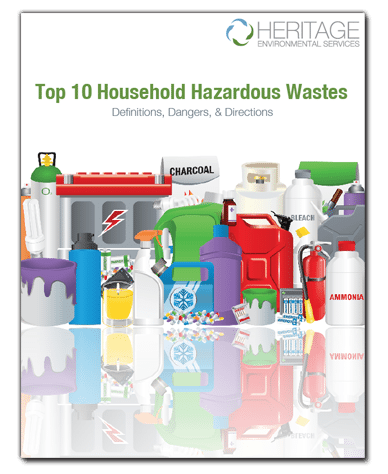
A couple of weeks ago we posted about Green Cleaning Supplies that could be used for spring cleaning. That made me think of what we can do with some of our chemical cleaning supplies if we no longer need them. As the weather warms up, you will likely see a household hazardous waste event come to your area. We’ve posted about HHW’s in the past but it’s always a good idea to get a refresher on valuable knowledge!
The EPA defines a household hazardous waste as, “leftover household products that contain corrosive, toxic, ignitable, or reactive ingredients.”
- Corrosive materials are any material that can cause skin damage to people or a substance that significantly corrodes metal. Items like bleach, ammonia, and several household cleaners would fall into this category.
- Toxic materials are poisonous meaning they can cause illness or death. Vehicle fluids like antifreeze and gasoline are toxic.
- Ignitable materials are those items that have the potential to ignite during routine handling due to friction or heat sources, or by contact with other chemicals. Alcohol containing items are often ignitable.
- Reactive materials are those which tend to react spontaneously during routine handling, to react vigorously with air or water, to be unstable to shock or heat, to generate toxic gases, or to explode. A common reactive combination is that of mixing bleach and ammonia which will expel a toxic gas [source].
Due to the potential dangers of these products, many cities have HHW events to provide a safe place for disposal of unneeded items. If you are unsure about what items in your home may qualify as household hazardous wastes, we have put together a helpful eBook on the subject. It details 10 different types of household hazardous wastes and provides information about what they are, why they are dangerous, and what you should do with them. It also contains lists of items that fall into each of the 10 categories. If you are interested in this eBook just clock the button below to be taken to the download form.
More News From Heritage
-
12/23/24
Wreaths Across America 2024
This year, through collective effort and heartfelt generosity, we sponsored 727 wreaths and transported two truckloads of wreaths across the country.
-
12/2/24
Heritage Environmental Services Announces Rachel Evans as Chief Human Resources Officer
Heritage Environmental Services announced today that Rachel Evans will join the organization as Chief Human Resources Officer.
-
11/26/24
Honoring Teresa Wade: A Legacy of Dedication to Wreaths Across America
Celebrate Teresa Wade's legacy at Heritage Environmental and her dedication to Wreaths Across America. Learn her story and how you can honor veterans
-
11/14/24
Bright Futures Begin Lead-Free: Reducing Lead Exposure Together
Learn about lead decontamination, disposal processes, and join us in creating a lead-free future.
-
11/11/24
Celebrating Our Veterans at Heritage Environmental Services
-
10/31/24
Heritage Environmental Services Secures Commercial Permit Status for Orange, TX Incinerator
Learn more about Heritage Environmental Services securing a commercial permit for its Orange, TX incinerator, expanding waste disposal solutions.
-
10/14/24
Heritage Environmental Services Announces Timothy Thomas as Chief Operating Officer
Heritage Environmental Services (“HES”), an EQT Infrastructure portfolio company, announced today that Timothy Thomas will join the organization as Ch
-
10/1/24
Heritage Environmental Services Complete Acquisition of EBV from General Dynamics
Heritage Environmental Services, an EQT Infrastructure portfolio company, has completed the acquisition of EBV from General Dynamics.








